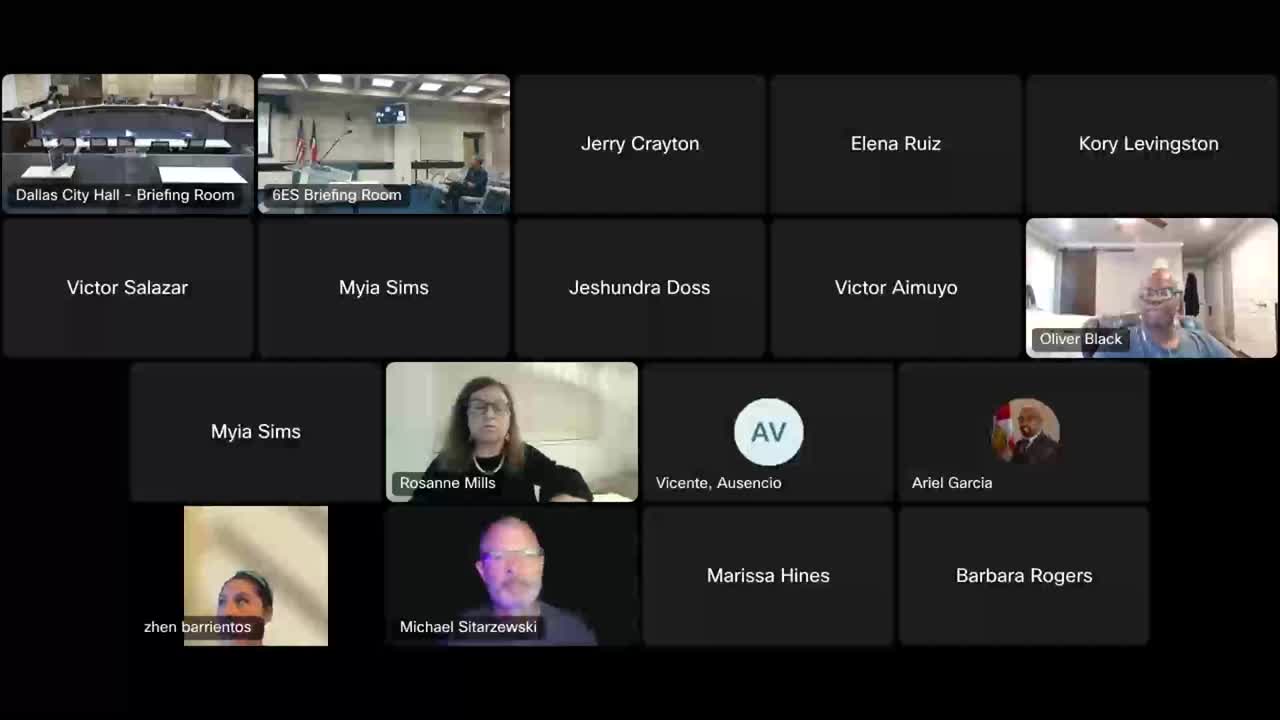Dallas officials say city missed HUD timeliness test for CDBG funds; council process, reprogramming planned
Get AI-powered insights, summaries, and transcripts
Subscribe
Summary
City staff told the Community Development Commission that Dallas failed HUD’s annual CDBG timeliness test on Aug. 2, 2025, and outlined steps — an expenditure forecast to HUD, monthly reporting to a finance committee and potential one‑time projects — intended to regain compliance. Staff also briefed the commission on a substantial amendment to the
Dallas city staff told the Community Development Commission on Oct. 9 that the city did not meet the U.S. Department of Housing and Urban Development’s annual timeliness test for Community Development Block Grant (CDBG) funds on Aug. 2, 2025, and described steps to regain compliance.
Shan Williams, Budget and Management Services, Grants Division, said HUD’s rule “requires that the city of, CDBG funds be spent in a timely manner, and that timeliness is tested, annually.” On slide 4 of the presentation, Williams told commissioners: “the city did not meet this requirement on 08/02/2025,” and that “the city's ratio was at 1.86. Or we are we were $4,732,000 greater than the minimum balance that HUD would allow.”
Why it matters: HUD limits a grantee’s unspent CDBG balance to no more than 1.5 times the grantee’s annual allocation; failure to meet that threshold can reduce a future entitlement grant. Williams said the city has received notice from HUD and is required to submit an expenditure forecast and a corrective plan showing how it will meet the test on Aug. 2, 2026.
What staff said they will do: Williams and other presenters described a sequence of administrative steps and program reviews. Staff will (1) submit an expenditure forecast to HUD; (2) bring monthly updates to a finance committee of the commission and to city council committees; (3) evaluate existing CDBG projects for “viability” and potential reprogramming; and (4) identify eligible one‑time projects that can be completed within roughly nine months to accelerate spending. Williams said departments are “submitting their plans, looking at their expenditure, their budgets to see how they can accelerate expenditures.”
Staff and commissioners discussed the causes. Williams and another presenter said part of the backlog traces to pandemic-era federal funding flows and slower project starts: HUD’s less‑restrictive COVID relief dollars and a large influx of funds created administrative backlogs, and some CDBG projects “have been a little slower ramping up.” Williams said CDBG funds remain allocated to projects but that some projects have delayed starts or require reprogramming.
Program income and a closed revolving loan program: Staff also described a one‑time program income receipt from a closed revolving loan program as part of the current budgeting picture. Williams said the revenue came from a long‑running revolving loan program tied to earlier HUD funding that closed and returned proceeds to the city; those proceeds are treated as program income for HUD purposes. Williams said program income must be spent first under HUD rules and that in this instance the city recorded about $2,000,000 in program income in a substantial amendment (the exact amount and line items will appear in the amendment documents).
Substantial amendment and departmental reorganization: The commission also received a briefing on “Substantial Amendment No. 1” to the city’s Consolidated Plan and annual action plan. Staff said the amendment responds to citywide operational reorganizations and federal directive reviews. The briefing listed four city units that the budget consolidated: the Office of Community Care, the Office of Homeless Solutions, Housing and Community Development, and the Fair Housing/Office of Equity and Inclusion (Fair Housing division), all of which receive HUD funds. Staff said because those guiding documents and departmental responsibilities changed after the Consolidated Plan was submitted to HUD in August, HUD considers the changes a substantial amendment. The presenter said council work on related policy changes is still underway and that the city extended the public comment period; the public hearing remains open and staff expect final adoption on Dec. 10 pending council approvals.
Commission response and next steps: Commissioners pressed staff for specifics about causes, examples and what the commission can do. Commissioner Groban asked whether being above the HUD threshold is “considered, a striking point for us?” Williams replied that HUD treats the situation as noncompliance but that HUD has allowed grantees time to correct similar issues after COVID. Commissioner Mills asked for specific examples; Williams described the closed revolving loan/CDFI (Southern Dallas Development Corporation) as a one‑off program income source and reiterated that most CDBG dollars are budgeted to projects. Williams and other staff said more detailed project‑level analysis will be provided to the commission’s finance committee, and the commission requested a deep dive at the November meeting on projects, causes of underspending, and what the commission can influence.
Formal actions and assignments at the meeting: the commission approved the Sept. 4 meeting minutes by voice vote. No commission vote was recorded at this meeting to change CDBG allocations or to adopt the substantial amendment; staff said the city will run required public notices and return for final adoption after council action.
What remains uncertain: staff flagged that certain projects are slower because of construction timelines and eligibility requirements for CDBG‑eligible activities (for example HUD requirements that some public‑improvement work be in primarily residential, low‑ and moderate‑income areas). Williams said staff are prioritizing acquisitions and other one‑time activities that can be completed quickly to lower the city’s balance by the Aug. 2, 2026 test date.
The commission scheduled monthly finance‑committee briefings and asked staff to bring a detailed plan for November that breaks down which projects are delayed, which are candidates for reprogramming and which issues are within the commission’s control.
